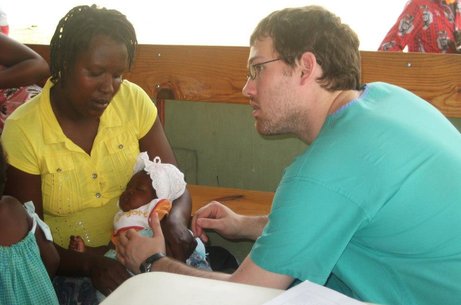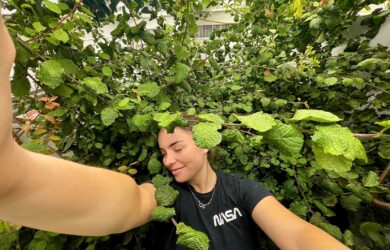
Scholar Elect Joseph McAbee's research will focus on understanding the genetic make-up of the most common and malignant brain tumours occurring in adults.
Glioblastoma is the most common brain tumour occurring in adults and the most malignant. About 2500 cases are diagnosed in the UK every year. Less than 14% of patients diagnosed with a malignant brain tumour are alive at 10 years.
Joseph McAbee’s PhD, which he will start this autumn, will focus on understanding the genetic make-up of this form of cancer and developing the targeted therapies which will be most effective in treating the many varieties found in different patients.
It will build on the research he has been doing as a medical student at Wake Forest School of Medicine in the US where he worked for a summer on the paediatric oncology education programme at St Jude Children’s Research Hospital.
He says it was instrumental in his decision to do a PhD. “They were dealing with some of the worst diseases of childhood and they showed me the link between the research laboratory and what goes on at the patient’s bedside and the importance of early treatment. It was an incredible experience. It showed me that I wanted to learn more about neuro-oncology,” says Joseph who has since been collaborating with some of his mentors at St Jude on several papers for peer-review journals.
In 2013, he spoke at the American Association of Neurological Surgeons about treatment regimens for cervicomedullary tumours, a type of cancer with which St Jude has a great deal of experience. He worked on papers during weekends and nights around his medical training. So far three have been published. One paper addresses burnout in neurosurgery and its potential impact on physicians and patient care. He has also submitted two papers on cervicomedullary tumours and neurosurgery for children with hydrocephalus and is in the process of writing another paper on malignant brainstem tumours.
Childhood
Joseph knew he wanted to be a doctor from an early age. He was born and grew up in the small town of Woodruff in South Carolina. An only child, his father is a retired math, science and social studies teacher and his mother is a curriculum specialist who was formerly a principal and kindergarten teacher. Education was an important influence at home and Joseph was very studious from an early age.
He also enjoyed sport, music, playing piano and saxophone/French horn in his school’s band and was in his church’s youth group, attending church several times a week.
From the age of around nine he decided he would be a doctor. He was drawn to the idea of helping others. “No one in my family was a doctor, but I knew that physicians were able to help people on a very personal level at some of the toughest times of their lives,” he says.
At around the age of 12, he started doing mission trips with his church. He was first aid coordinator on housing construction projects and really enjoyed it. As he got older and became more fascinated by the medical profession he started reading books by doctors.
One summer he went on a National Youth Leadership Forum on Medicine at Emory University in Atlanta which only confirmed his interest in medicine.
During his senior year at Woodruff High School, his mother gave him a book by a neurosurgeon. Joseph became interested in neuroscience so when he began his degree at Wofford College he took classes in neuroscience as well as majoring in biology.
His neuroscience coursework also included psychology and research courses. He says his professors were a major influence, supporting him to consider a research career. His first experience with research was in the summer after his second year.
He won the Pauletta and Denzel Washington Gifted Scholars in Neuroscience Award to go to Cedar Sinai Medical Center in Los Angeles where he worked in the department of neurosurgery on vaccinations for glioblastoma. “It was my first experience of high level research with applicability to human health,” says Joseph.
The following summer he won a scholarship to do neuroscience research at the University of Sydney’s Brain and Mind Research Institute.
His undergraduate course was four years long and during that time he became increasingly involved in research projects. He worked on a project looking at how an NMDA receptor antagonist (D-AP5) affects the feeding and foraging behaviour of rats. He was also involved in cognitive and behavioural neuroscience experiments in the psychology department.
Medical training
After graduating, he went straight to Wake Forest School of Medicine and was soon working in clinics with patients. He spent a lot of his spare time working at Wake Forest’s Delivering Equal Access to Care (DEAC) Clinic which provides care for the most disadvantaged members of the local community. He volunteered in his first year, was floor manager helping with check-in, triage, and pharmacy in his second year and was clinic operations co-director in his third year, implementing new programmes aimed at delivering more efficient healthcare, and was the student leader in charge of all aspects of the clinic as executive co-director.
“It was a wonderful opportunity to see what it is like to run a free health clinic and provide for an identified medical need in our community. It was also rewarding to provide opportunities to my fellow students to achieve their service goals,” he says. During the spring semester of his first year he had also volunteered to go with a team of medical students to Haiti [see picture].
In 2014 he decided he wanted to take some time out of his medical training to learn more advanced neuroscience research techniques and principles. He looked at different research programmes and was drawn to Cambridge’s Biomedical Research Centre’s work on genomics for neuroscience, particularly Dr Colin Watts’s research on the genomics of glioblastoma.
He applied to Cambridge and for a Gates Cambridge Scholarship. He was drawn to the scholarship because of its combined emphasis on cutting-edge research and service. His PhD, which he will do in collaboration with the National Institutes of Health, will involve sequencing tumour samples. He will specifically focus on the clonal dynamics of glioblastoma treatment resistance and progression. He hopes that after completing his medical training he will be able to keep one foot in research and one in patient care.












